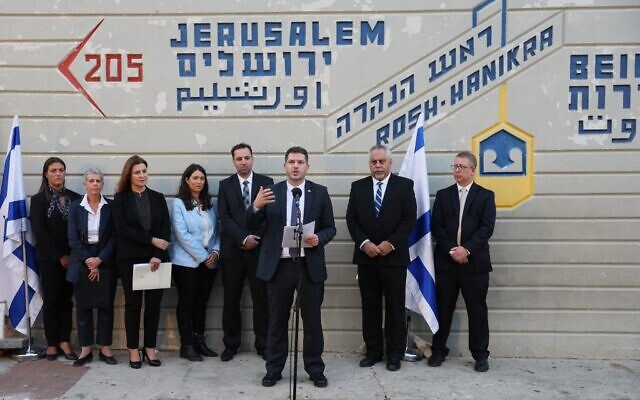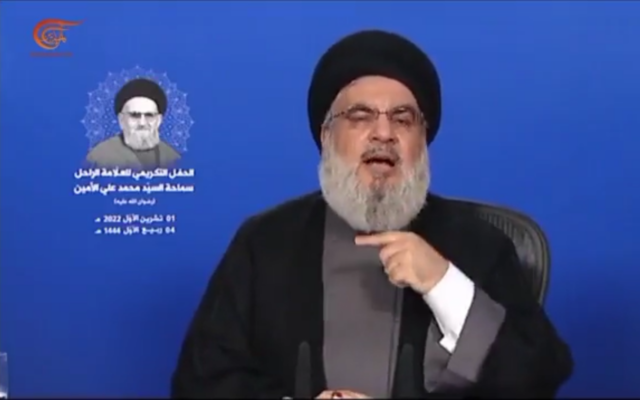I became your enemy because I tell you the truth
Israel and Lebanon’s landmark maritime border deal went into effect Thursday evening after a ceremony at a UN base near the border, ending years of conflict over the matter and repeated saber-rattling by the Hezbollah terror group.
US mediator Amos Hochstein hailed “a great day” for Israel, Lebanon and the broader region. Prime Minister Yair Lapid said the agreement represented de facto recognition of Israel by Lebanon. While Lebanon’s President Michel Aoun rejected this claim, the chief Lebanese negotiator spoke of “a new era” and invoked the Abraham Accords treaties between Israel and other regional states.
Delegations from both countries met but did not interact at the Lebanese border village of Naqoura to finalize the agreement. No photos were issued from the bilateral event.
The deal was signed separately earlier Thursday by Aoun in Beirut and Lapid in Jerusalem, and went into effect after the papers were delivered at the ceremony to US mediator Hochstein, who added his own signature.
Israel was represented at the border event, near the Rosh Hanikra crossing, by Energy Ministry Director-General Lior Schillat.
Israeli and Lebanese officials described a tense but emotional ceremony to ratify the agreement. A Reuters reporter, citing an official in Naqoura, said the two delegations sat around a small table alongside Hochstein and a UN delegation.
The Israelis and Lebanese did not talk to each other, but at the end of the ceremony, Hochstein said, “We have a maritime border. Congratulations!” and everyone clapped, the report said.
The deal paves the way for both sides to engage in lucrative offshore natural gas extraction after long years of disagreements over drilling rights.
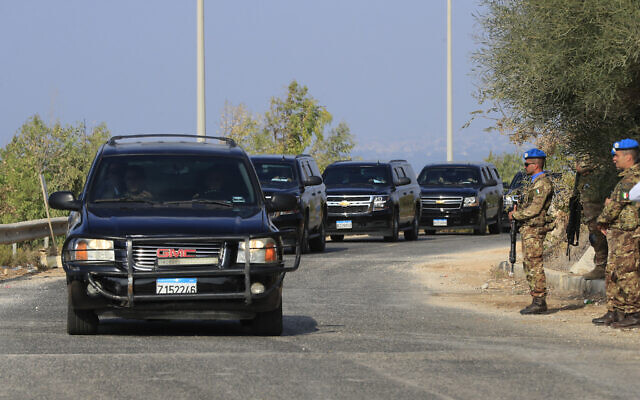
It comes as Lebanon hopes to extract itself from what the World Bank calls one of the worst economic crises in modern world history, and as Lapid sought to lock in a major achievement, days ahead of a general election on November 1.
Aliza Bin-Noun, political director at Israel’s Foreign Ministry, said it was a “fair agreement,” and that it was “the first time that an enemy state recognizes the Israeli border. The agreement has the ability to advance deals with other countries.”
She later confirmed to Army Radio that while both sides were in the tent at the UN base, she could not interact with the Lebanese side.
There was no opportunity to talk, she said.
Nevertheless, she said it was a “very emotional” ceremony for her, noting that she grew up in Nahariya on Israel’s northern border, and for her, Lebanon had always meant katyusha rockets and threats from Hezbollah — not international agreements.
She noted that while the agreement was not a peace deal, it was nonetheless an agreement between states, and could serve as a precedent for progress between Israel and other countries with which Israel has no ties.
Though the deal maps out each country’s rights for gas fields, Beirut and Jerusalem offered different assessments on its broader implications.
Before signing, Lapid claimed that Lebanon’s signing onto the deal amounted to a de-facto recognition of the Jewish state.
“It is not every day that an enemy state recognizes the State of Israel, in a written agreement, in front of the entire international community,” he said.
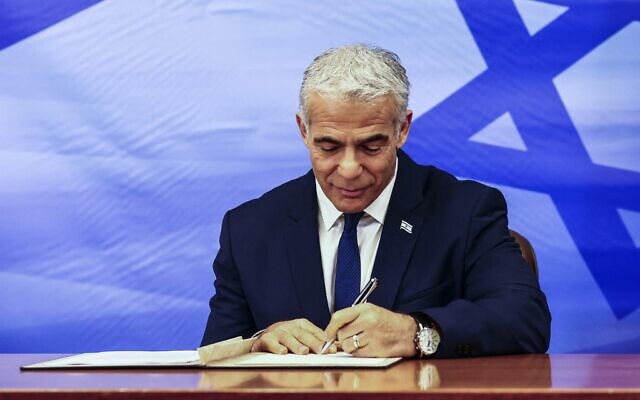
Aoun rejected Lapid’s assertion, countering that “demarcating the southern maritime border is technical work that has no political implications.”
Still, the top Lebanese negotiator, deputy parliament speaker Elias Bou Saab, hailed a “new era.”
“We have heard about the Abraham Accords,” said Bou Saab, according to Reuters. “Today there is a new era. It could be the Amos Hochstein accord.”
US President Joe Biden hailed as “historic” the agreement that comes as Western powers clamor to open up new gas production and reduce vulnerability to supply cuts from Russia.
“Both parties took the final steps to bring the agreement into force and submitted the final paperwork to the United Nations in the presence of the United States,” Biden said in a statement.
Hochstein and Lapid met after the ceremony, and Lapid praised Hochstein for his role, saying the deal “would not have been possible” without Hochstein’s work and the support of President Biden.
Hochstein said the US was happy to help, “and to support Israel’s security, stability and economic prosperity… Today is the beginning, not the end,” he went on. “If there is a prosperous Lebanon north of the border of Israel, that is a win for everyone.”
Added Hochstein: “This is not just a great day for Israel and its security, and for Lebanon, it’s for the broader region, in the Middle East, and particularly the Eastern Mediterranean.”
Lapid thanked Biden for his “leadership in helping bring about today’s historic agreement between Israel and Lebanon,” and said it would “strengthen Israel’s security, bolster our economy and help deliver cheaper energy to people around the world.”
Following the signing ceremony, Schillat said that the deal “serves the interests of the two sides and enables Israel to protect itself.”
“We appreciate the efforts by Lebanon in reaching the agreement,” he said. “Energy can build ties also between enemy states.”

After the deal was sealed, Lebanese terror group Hezbollah said it would end its mobilization against Israel, after threatening to attack if Jerusalem began extracting natural gas at the Karish drilling site before a deal was finalized. Gas extraction began at Karish on Wednesday.
“All the exceptional and special measures and mobilization carried out by the resistance for several months are now declared over,” Hezbollah leader Hassan Nasrallah said in a televised speech, calling the agreement a “great victory for Lebanon.”
“Our mission is complete,” Nasrallah said, adding that the deal “is not an international treaty and it is not a recognition of Israel.”
Israeli Ambassador to the US Michael Herzog also spoke to Army Radio and was asked about media reports that there is a US-Israel memo on the agreement that has not yet been finalized.
Herzog would neither confirm nor deny the report but said that the agreement includes certain US guarantees to Israel.
The Axios website, citing unnamed Israeli officials, reported that Jerusalem and Washington were negotiating a letter of assurances of US security commitments and that a guarantee to prevent future revenues from the Lebanese gas fields from going to Hezbollah.
Channel 13 News reported that during the cabinet meeting to approve the agreement, Alternate Prime Minister Naftali Bennett scoffed at the notion of US assurances to Israel for the deal, telling ministers that such a memo “is worthless.”
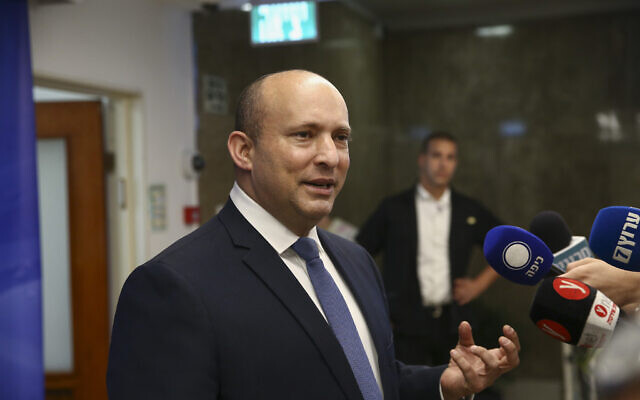
Three unnamed ministers who were at the meeting told the station that Bennett warned: “If Hezbollah violates the agreement the US won’t send paratroopers to drop on Naqoura, Israel will need to deal with it using its own forces. Don’t count on guarantees.”
Delicate dance
Israel and Lebanon are technically still at war and the deal does not touch on the land border.
However, the agreement is seen by Israeli leaders as tacit recognition of Israel by Lebanon.
Before the maritime border agreement was reached, Hezbollah — which launched drones toward Karish in July — had threatened attacks if Israel proceeds with gas extraction in the disputed area.
The deal comes as political parties in Israel — including Lapid’s centrist Yesh Atid — jockey for position in next week’s general election, the fifth in less than four years.
Former prime minister Benjamin Netanyahu has his sights set on a comeback and dismissed the maritime deal as an “illegal ploy” early this month, though he has since appeared to soften his opposition to it.
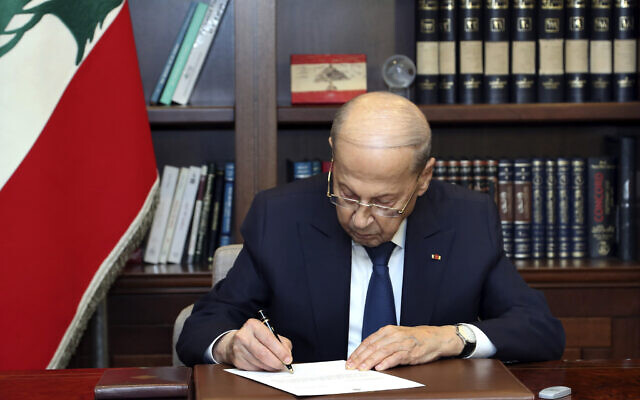
London-listed Energean on Wednesday said it had begun producing gas from Karish, an offshore field at the heart of the border agreement, a day after Israel gave the green light.
Lebanon meanwhile will have full rights to operate and explore the so-called Qana or Sidon reservoir, parts of which fall in Israel’s territorial waters, with the Jewish state receiving some revenues.
No quick fix
With demand for gas rising worldwide because of the energy crisis sparked by Russia’s invasion of Ukraine, Lebanon hopes that exploiting the offshore field will help ease its financial and economic crisis.
But analysts caution that it will take time for production to start in Lebanese waters, meaning no quick return for a country that is desperately short of foreign exchange reserves.
Exploration has so far only been tentative — a 2012 seismic study of a limited offshore area by the British firm Spectrum estimated recoverable gas reserves in Lebanon at 25.4 trillion cubic feet, although authorities in Lebanon have announced higher estimates.
The maritime border deal could not be signed by Lebanon without the consent of Hezbollah, a powerful Shiite faction backed by Israel’s arch-nemesis Iran.
Israel and Hezbollah fought a 34-day war in 2006 and the Shiite terror group, which has an arsenal of more than 100,000 rockets and missiles for potential use against Israel, is the only faction to have kept its weapons after the end of Lebanon’s 1975-1990 civil war.
https://www.timesofisrael.com/in-border-ceremony-without-handshakes-israel-lebanon-agreement-goes-into-effect/?utm_source=The+Daily+Edition&utm_campaign=daily-edition-2022-10-28&utm_medium=email
Michael Loyman

